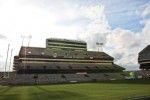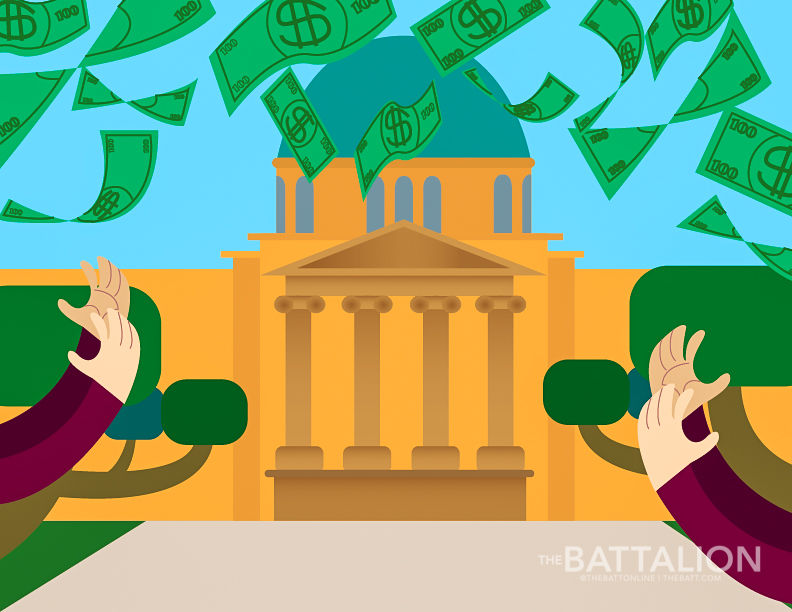As the financial breakdown of the Kyle Field redevelopment project unfolds, the A&M administration is deciding how students will foot their portion of the bill.
With the proposed scope and scale of the project, we are going to need many groups assisting with the renovation and expansion of Kyle Field, University President R. Bowen Loftin said in a prepared statement.
Loftin met with student leaders to better form a plan of action to find funding for the east side or student section of Kyle Field.
“We look forward to a major project,” Loftin said at a press conference announcing a hotel tax agreement with B-CS leaders. “Probably the largest project ever done at Texas A&M University and perhaps the largest in Texas.”
Of the estimated $425 million cost of renovating Kyle Field, $95 million will go toward the renovation of the east side and $20 million will be raised through philanthropy and seat licenses, which must be on the first deck between the 30-yard lines according to SEC guidelines. For the remaining $75 million, Loftin proposed students raise the money because students are the primary users of the east side.
The conceptual expansion of the student section will include the removal of the Read Building to clear more space for expanded concourses in addition to a new first deck, renovated and expanded restrooms, enhanced concessions, additional entry and exit points and new benches for standing.
“In overview, they are lowering the field by about seven feet,” said Scott Bowen, speaker of the student senate. “They are also lowering first deck and renovating it to add several rows and then add premium seating above that. Second deck and third deck will remain unchanged, the bathrooms and concessions will be renovated to some degree.”
While the number of seats available to students will remain consistent, A&Ms vice president for marketing and communications, Jason Cook, said other universities demand several thousand dollars for seat licenses and tickets for the prime seats between the 40 and 50 yard lines that A&M students retain in Kyle Field.
“This certainly affects annual revenues for the Athletic Department and financing options for the stadium renovation,” Cook said. “But its a sacrifice that we are willing to make to ensure that Texas A&M remains the home of the 12th Man.”
Texas A&M, Arkansas and LSU are the only SEC schools that do not require students to pay mandatory fees to support athletics. To discuss revenue-raising possibilities from students, Loftin met with various student leaders, including representatives from the Yell Leaders, Corps of Cadets, SGA, MSC, 12th Man Student Foundation, Student Athlete Advisory Committee and other groups.
“I asked that the student leaders consider these options and then provide their feedback to me before we take any additional steps,” Loftin said.
Among those present was MSC president Tyler Stewart, who said student leaders were presented with options to take back to their constituents.
“They offered three different options,” Stewart said. “The possibility that students could help pay for it solely through a fee or that students could help pay for it solely through an increase in football ticket prices or possibly a combination of those two things.”
A student fee increase isn’t a new venture for Kyle Field renovations. When the third deck was added in the early 1980s a nearly $21 million project about 40 percent was afforded by athletic concessions, local funds and student fee revenue bonds. When improvements and additions to the second deck were made in 1967, student fees and athletic revenue covered the $1.9 million cost. The most expensive renovation to Kyle Field without consideration of inflation, since its $345,000 original construction, was the addition of the Zone for more than $30 million, which was funded by seat license and ticket sale revenue.
At last weeks Student Senate meeting, SGA had a few propositions, which if passed will be sent to the A&M administration for consideration.
Three plans were proposed after a failure to overturn Student Body President John Claybrook’s veto of the Kyle Field Renovation Bill, which stated Student Senate would oppose any increase in mandatory fees for the renovations.
The front runner plans proposed by SGA members were Claybrook’s plan to raise three-fifths of the total with an increase in sports pass costs and two fifths from student fees, Student Senate Speaker Scott Bowen’s proposal to tap into the University Advancement Fund, and a plan to help raise revenue through the sale of alcohol during football games.
Fielding Kyle
January 29, 2013

0
Donate to The Battalion
Your donation will support the student journalists of Texas A&M University - College Station. Your contribution will allow us to purchase equipment and cover our annual website hosting costs.
More to Discover








